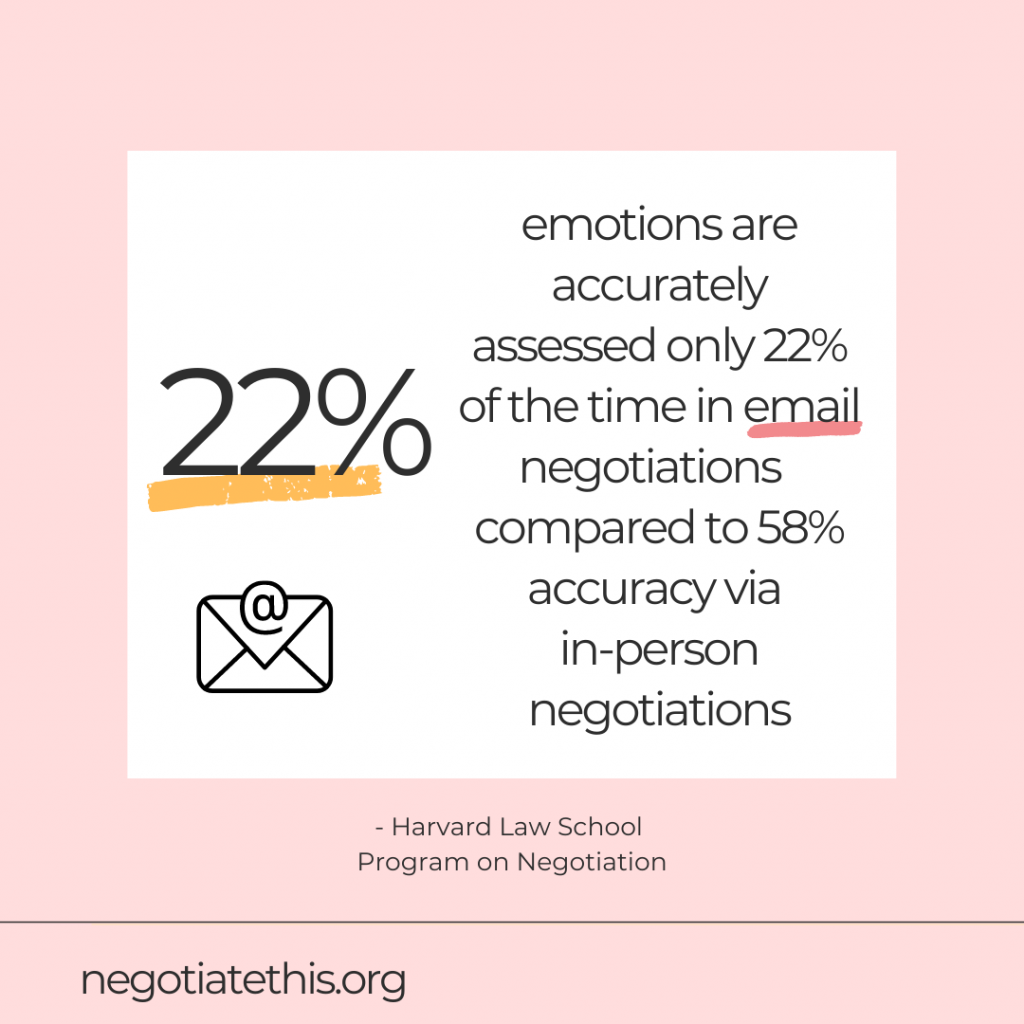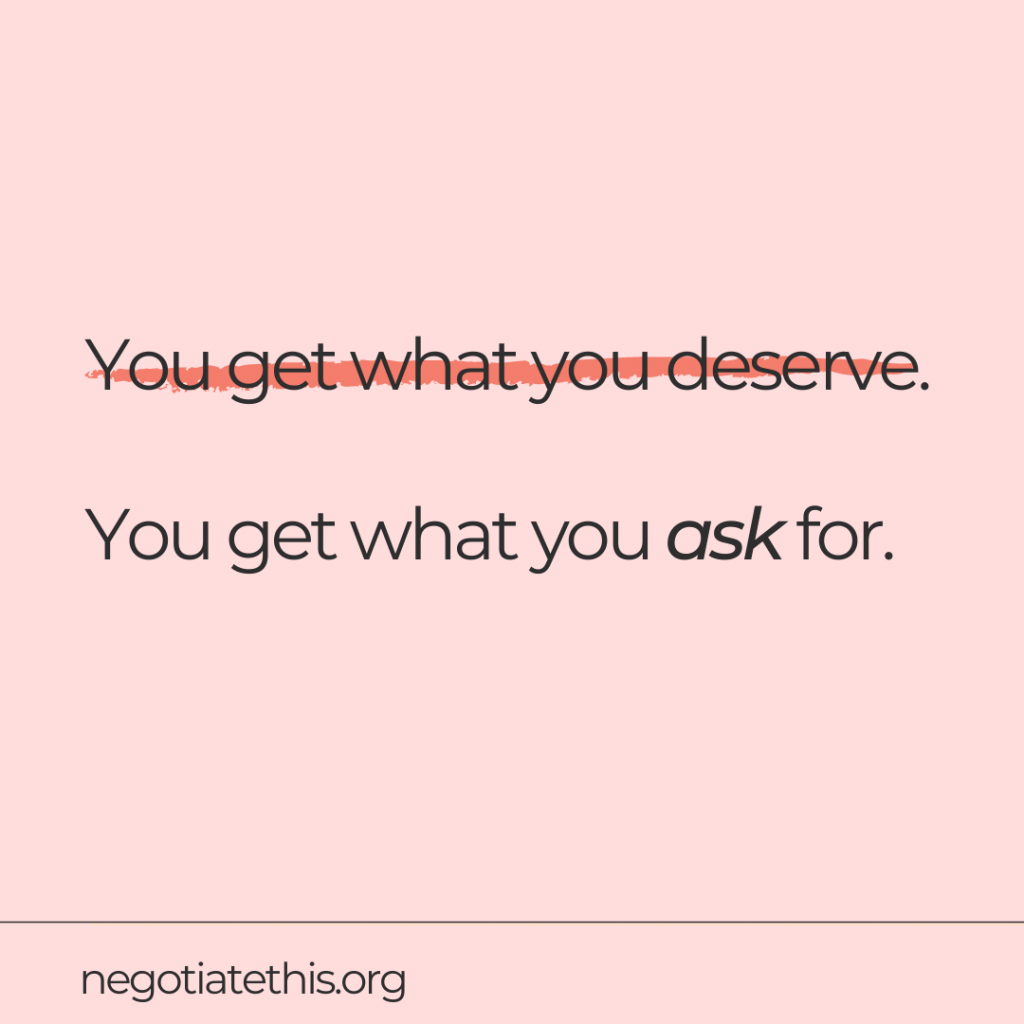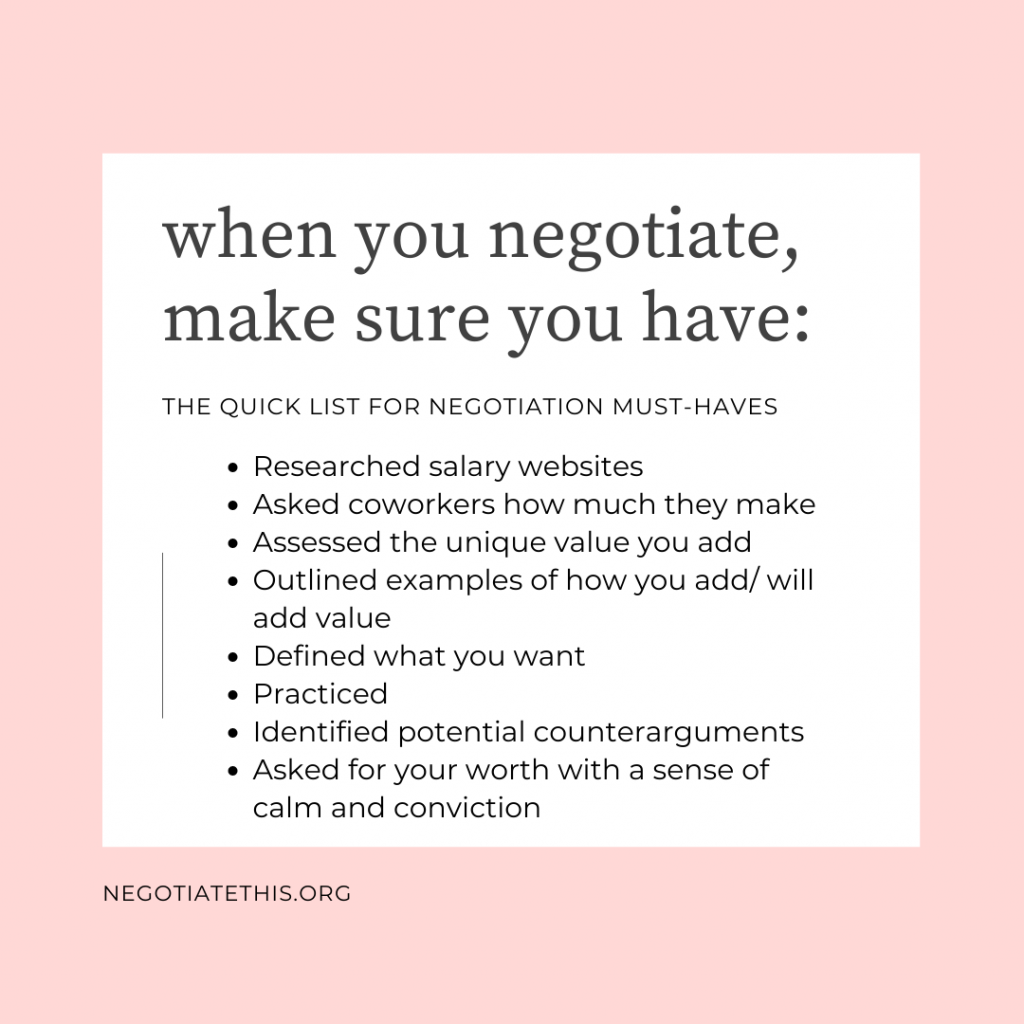Have you ever wondered what the best and worst methods for negotiating are? Should you send an email? Make a phone call? Set up a Zoom meeting? Meet in person? It can be tough to decide and you may want to default to the easiest option for you.
**Disclaimer: The method chosen for negotiating may largely depend on WHO you are negotiating with. Recruiters may prefer email. Negotiating with a future boss, using a different method may yield better results. Read on for more info.
The easiest option at first glance may be to send an email to negotiate. Where would you rate this on the scale of best to worst methods for negotiating? Sending an email to ask for a meeting is acceptable. Where you may get find difficulty is if you email your entire negotiation request. While emailing to negotiate may feel like the easiest option initially, the outcome may not be as appealing.

Finding the Best and Worst Methods for Negotiating: Reading Emotions Is Key
It is obvious that it is more difficult to read someone’s emotions over email. Assessing emotions and intercepting subtle cues through body language and tone of voice are important factors. Reading the room and taking into account the minute nuances that take place can be pivotal in negotiation. Your ability to interpret these cues gives you an advantage in a negotiation. These cues are hard to interpret via email.
Email: Best or Worst Method for Negotiating?
Surprise to no one… it is better to NOT negotiate over email. Do it in person. Make a call. Schedule a video call. Whatever you do, it is probably better to do anything except negotiate over email.
Of course, there will be exceptions. You will always find exceptions. There will always be someone who had great success negotiating over email. (Are you one of those people? Comment below with your story!) There will always be certain business transactions that can be negotiated via written word. For the general population and the rest of the world, you are better off negotiating when you can hear and/or see the other party’s expression and response.

Easier Is Not Always Better
I know it’s “easier” to negotiate over email. But… easier for whom and for what outcome? Easier to press the “send” button because you are nervous and afraid of their reaction? Yes. Easier for your boss to say “no” to your request? Quite possibly yes. Easier for you to get what you want? Not so much. It may be “easier” in one sense (the sending part). But as you can see, easier is not always better.
I get it. I’ve been there. I’ve sent one of those emails. I was nervous to approach my boss. I was timid and afraid of the response. Was I asking for too much? Would I seem ungrateful? What if they said no? I didn’t think I could take that sort of reply in person. (Psst – These are all limiting beliefs that likely aren’t true, especially if you are a valued employee or a valued candidate they want to join the organization).
*Disclaimer: If negotiating with a recruiter, email may be preferable so they can have specific details and evidence written out to make a case to their superior.
I can tell you firsthand, it is better to negotiate in person or over the phone (or video call is also a new norm). In an email negotiation, the only easy part is pressing the “send” button. If you send your negotiation request via email then the other party also gets to think out their whole perfect response too. That response could very well be how to tell you “no”. Or it could be to give you less than what you want. If you aren’t present for the negotiation in real time, you don’t have the advantage of reacting to and assessing their response in real time. And it IS an advantage.

Conveying Emotion
It’s pretty intuitive that negotiating over email leaves you clueless to how they received your ask. If you think you convey your emotions well via email (whether it be with lots of !, caps (probably don’t ever use those), or phrasing), you’re likely not getting across what you think you are. “Research shows that people are less adept at conveying their emotions in email negotiations than they think they are” (Harvard Law School Program on Negotiation, 2021).
Research on Best and Worst Methods
One study focusing on “how effective negotiators are at detecting specific emotions conveyed via email, such as empathy, embarrassment, anger, interest, and contempt” found that it was more difficult to interpret these emotions in email negotiations compared to in person (Harvard Law School Program on Negotiation, 2021).
“In one experiment, two trained data coders who independently studied the same transcripts of email negotiations agreed on which emotions study participants expressed only about 22% of the time. Often, the coders’ judgments clashed, as when one thought a participant was expressing anger and the other thought the same person was expressing interest” (Harvard Law School Program on Negotiation, 2021).
Difficult to Interpret Emotion Over Email
Negotiators accurately detected emotions with 58% accuracy in person under the BEST circumstances (Harvard Law School Program on Negotiation, 2021). Email does not stand a chance at interpreting emotion when compared with other methods.
“It might feel much easier to explain why you’re not happy with the salary offer via email, but I always recommend picking up the phone.Why? You want them to hear the sincerity and professionalism through the tone of your voice. Also, conversations involving money are sensitive, and doing it over a call can help avoid any miscommunication” (O’Donnell, 2021).

Missed Cues
In email negotiations, “politeness rituals” are bypassed “and that sets the stage for diminished trust” (Nasher, 2020). “E-Mail Negotiators are more likely to suspect the other party of lying, even if there is no factual basis,” (Nasher, 2020). As we all know, emails are easy to ignore. This may also mean your request may be forgotten. Or it may be at the bottom of a long to-do list. The urgency of an in-person, video call or phone call is plainly absent from an email.
Bottom line: We are not good at detecting emotion via email. Email is not the place to be negotiating if you can help it in most situations.
It can be nerve-wracking to negotiate. Understandable. But let your conviction of your worth outweigh your nerves and do the dang thing in person, over Zoom, or on a phone call. You won’t get better at negotiating unless you negotiate. You know your worth and have evidence to back it up. Be confident in your ask. The first time is the most stressful, the next time less so, and then you have the hang of it and know you can negotiate for your worth. Look at the variables to decide the best and worst methods for negotiating in your unique situation and let that guide your process.

Need to Negotiate Over Email?
If you need to negotiate over email, one recommendation is to give the other party a phone call before emailing your negotiation request. This gives you an opportunity to make small talk and find connections outside of the negotiation. This helps build rapport and each party feels more at ease (Nasher, 2020). Building rapport is key when much of the relationship building is absent over email. Think of this as a “combo method”. You are adding together a couple of different methods to get the best outcome.
Email Negotiations May Equalize
One perspective is that email negotiations can be an “equalizer” (Nasher, 2020). People who don’t normally get the chance to talk have just as much opportunity to participate via email. This then enhances the odds that women and those in different positions (not only those at the top) are negotiating. If negotiating over email is the chosen method, one tip is to check in with a phone call or in person frequently to get a “pulse check” on the other party’s emotions (Nasher, 2020).
My Personal Negotiation Preference
I am partial to negotiating in situations where the most signals can be read, i.e. tone, body language, facial expression, vibe, etc. Therefore, my preferences for best and worst methods for negotiating are as follows:
- In person – You can better read body language, you can hear the tone of the conversation, it is easier to assess any other environmental factors and comment on them.
- Video call – You can read body language and hear tone. You can see and hear cues to help you with your next move.
- Phone call – A lot can be conveyed in your voice. It is easier to read the tone and feeling. Some argue that a phone call is preferable because each party is only focusing on the sound (tone, words, pauses, breath).
- Email – The least can be conveyed via email. The message has a higher chance of being misinterpreted. It is difficult to get across your tone, feeling, etc and vice versa.

You Know the Best Method for You
Ultimately, the decision is up to you. You know the best and worst methods for negotiating in your individual circumstance. You know your situation, your superiors, your ask and your environment better than anyone. No one can tell you which is the best for you in your unique situation. Assess the factors and make the best choice for your negotiation.
You got this. You know what the best and worst methods for negotiating are for you.
Whatever your method may be, ask for your worth.
Sources
*Article: “In Email Negotiations, When They’re Happy, Do You Know It? In email negotiations, negotiators lack helpful visual, verbal, and other sensory cues — but can you rely on text alone?” (2021)
Author: Harvard Law School Program on Negotiation Staff (PON Staff)
*Article: “Never do these 2 things after getting a lowball salary offer, says career expert – a ‘perfect example’ of how to respond” @CNBCmakeit (2021)
Author: J. T. O’Donnell, Contributor @jtodonnell
*Article: “How To Negotiate Via Email” (2020) @forbes
Author: Jack Nasher, Negotiation Professional
Want More on Negotiation?
Want more negotiation tips? Check out these posts to help you in your next negotiation:
- 7 Steps to Take When You Find Out You’re Underpaid
- 3 Numbers You Need to Have Ready When Negotiating
- Top 5 Negotiation Tips for a Smoother Negotiation
- 3 Powerful Negotiation Tips No One Tells You
- Can I Make the First Offer in a Negotiation?
- 3 Easy Steps to Promote Yourself in a Negotiation
- 4 Important Questions You Need Answered Before Your Negotiation
- 3 Tips: Find the Numbers to Emphasize Your Valuable Contributions
- 6 Important Items to Think About When Asking for More
If you want weekly motivation and negotiation tips, sign up for blog posts and for daily inspiration follow @negotiatethis on Instagram. You got this. All you need is a little negotiation inspiration!

Disclaimer: While the contents of this post and blog come from research and personal experience, each experience, situation and/or person has their own unique circumstances. This is not negotiation, financial or any other form of legitimate or official advice from an expert. Each individual should do their own independent, comprehensive research. Negotiation, career and all other decisions are the sole responsibility of each individual or party. Details found on the blog and in individual posts are opinions and should be treated as such for entertainment purposes only. Read further disclaimer information in the footer and on the Disclaimer page.
